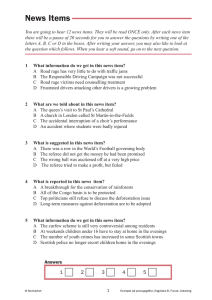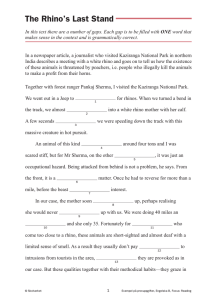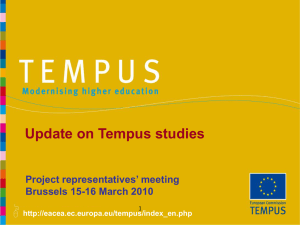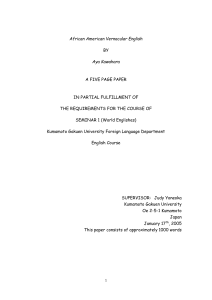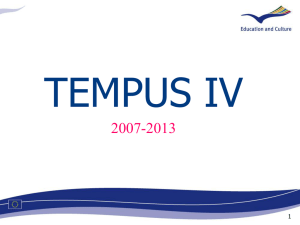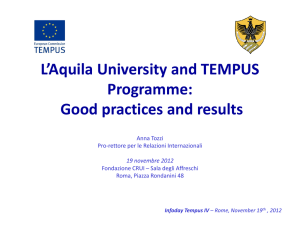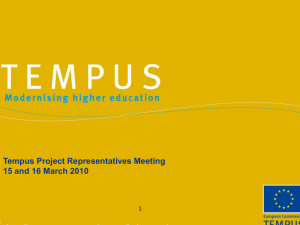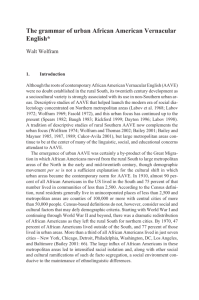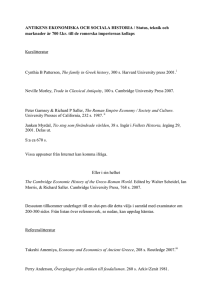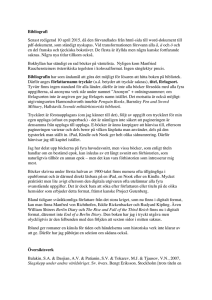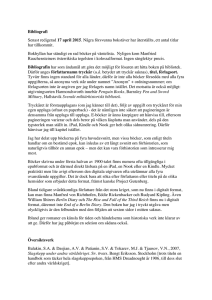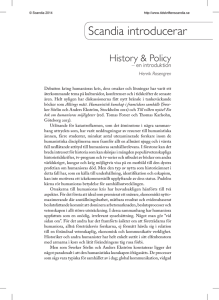Tempus och Tid i
advertisement
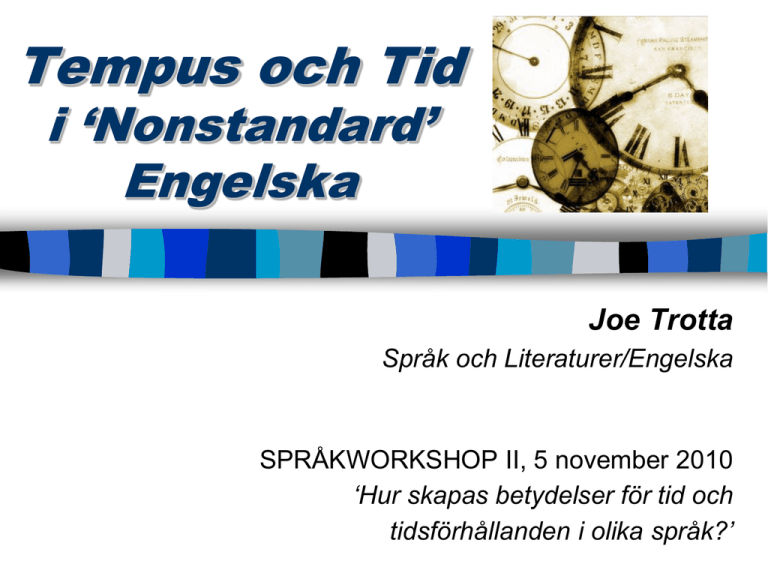
Tempus och Tid i ‘Nonstandard’ Engelska Joe Trotta Språk och Literaturer/Engelska SPRÅKWORKSHOP II, 5 november 2010 ‘Hur skapas betydelser för tid och tidsförhållanden i olika språk?’ Dagens presentation • Tempus vs. Aspekt • Tempus, tid, tidsformer och tidsrelationer Standard vs. nonstandard engelska • • • • Exempel på tempus i nonstandard engelska En närmare titt på AAVE Sammanfattning/slutkommentarer Tempus, tid, tidsformer & tidsrelationer ► A grammatical category vs ’real’ time referred to example: The train leaves at midnight. ► Verb inflection or whole vp ? example: He walks to work. He walked to work. Tense? Tense? He will walk to work. ► Whole utterance example: I want to go when he comes back. I can do that for you tomorrow. In 49 BC, Ceasar crosses the Rubicon. Standard English (from ‘above’) vs. Non-standard English (from ‘below’) Yo, wassup, yo, yo, yo! What's poppin’, dawg? I'm-a give it to ya straight up like ya don't know what hit ya. You're work is THE shit! I can't live without it, yo. Damn, niggah. Ya got it goin’ for y’all! "How do you do, Madame. I am extremely delighted to make your acquaintance. It would give me great pleasure if you would accept my invitation for a cup of tea, let's say, around five-ish?" Standard vs. nonstandard engelska A B C D E Standard ----|-----------|-----|---------|----------|--- Nonstandard A continuum of standardness (from Wolfram & Schilling-Estes, 2006) Exempel på tempus & tidsformer i nonstandard engelska A wider range of uses of the Progressive: I’m lovin’ it. So what are you wanting from me? A much more important role of habitual marking: He be sick. (AAVE) He be’s at home. (IrE) He does catch fish pretty. (Creole) A weakening of the strict division between the Present Perfect and the Simple Past: Did you eat yet? / Were you ever in London? (AmE) I know him since my school days (IrE). Some of us have been to New York years ago. Exempel på tempus & tidsformer i nonstandard engelska A weakening of the division between the Past Tense forms and Past Participle forms: He shoulda did that yesterday. You coulda took more time. We seen him do that. Be as a perfect auxiliary: They’re not left school yet. (IrE) Do as a tense and aspect marker: This man what do own this. (English Southwest) Wen ai did smaal tin woz chiyp. (Panamanian Creole) Reduction of have after auxiliaries: We shoulda left sooner. They coulda done better. Exempel på tempus & tidsformer i nonstandard engelska Completive/perfective done: You don ate what I has sent you? Past tense marker been: I been cut the bread. (AAVE) Was sit/stood with progressive meaning: When you are stood there, you can see the flames. (BrE) The general use of gonna as a future marker: I’m gonna do that later. It’s gonna rain soon. He gonna do it. (AAVE) Tempus/Aspekt i AAVE & SE: likheter SE AAVE present He walks He walk past He walked He walk(ed) pres. prog. He is walking He (is) walking past prog. He was walking He was walking perfect He has walked He done walked past perf. He had walked He had done walked Tempus/Aspekt i AAVE & SE: skillnader Phases/Tenses of AAVE Phase Example Pre-recent Past Recent Pre-present Past Inceptive Present She done work We did sing I do sing We singing Immediate Future I been seen him I'm a-sing Post-immediate I'm a-gonna do it Indefinite future He gonna sing Några exempel på ‘aspekt’ på AAVE Aspect Habitual/ continuative aspect Intensified continuative (habitual) Intensified continuative (not habitual) Perfect progressive Example SE Meaning He be workin' Tuesdays. He works frequently or habitually. He stay workin'. He is always working. He steady workin'. He keeps on working. He been workin'. He has been working. Irrealis (future He finna go to intention) work. He is about to go to work. Några intressanta hjälpverb i AAVE Stressed been (BIN) (Remote BIN) She BIN tell me that. She BIN eating. I BIN know him. He BIN a preacher. Completive done I done pushed it. You done changed. Invariant BE (Habitual BE) I be looking for somewhere to go. Your phone bill be high, don’t it? It be knives in here. I be in my office by 7:30. Sammanfattning & slutkommentarer • Förhållanden mellan tempus, tid, tidsformer och tidsrelationer är komplicerade • Nonstandard engelska kan uttrycka tidsrelationer på många sätt • Nonstandard engelska är inte mindre logisk, systematisk eller nyanserad än standard engelska • Tidsformerna på nonstandard engelska kan ge en insikt om eventuella språkförändringar • Fråga: Kan skillnader i SEs och NSEs tidsformer spegla olika tidsuppfattningar? TACK!
